Due to the campus closure on February 2, the SURF application deadline has been extended to 4:00pm on Tuesday, February 3, 2015. More information on SURF can be found at http://ugradresearch.uconn.edu/surf/.
News
• Congratulations, Fall 2014 UConn IDEA Grant Recipients!
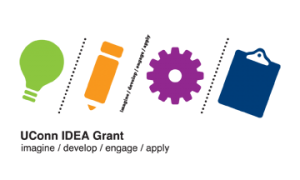 Congratulations to the twenty-six UConn undergraduates who have been awarded UConn IDEA Grants in the fall 2014 funding cycle!
Congratulations to the twenty-six UConn undergraduates who have been awarded UConn IDEA Grants in the fall 2014 funding cycle!
Eighteen of the award recipients will be completing individual projects and eight will be working on collaborative group projects. The award recipients represent a variety of disciplines, from puppetry to mechanical engineering, nursing to horticulture, and campus affiliations, including three recipients from the Stamford campus and one from the Avery Point campus.
Click here to view the full list of Fall 2014 UConn IDEA Grant recipients.
Special thanks to the faculty and staff who supported student applications to the UConn IDEA Grant and to those who will be mentoring the award recipients as they complete their projects. We would also like to thank the faculty and staff from around the University who served as reviewers.
The UConn IDEA Grant program awards funding to support self-designed projects including artistic endeavors, community service initiatives, traditional research projects, entrepreneurial ventures, and other creative and innovative projects. Undergraduates in all majors at all UConn campuses can apply. Applications are accepted twice per year from individuals and from small groups who plan to work collaboratively on a project. The next application deadline is Monday, March 16, 2015.
• Student Accomplishments – Fall 2014

Please join us in congratulating the UConn undergraduates named below for their significant research and creative accomplishments this fall. Students: if you have an accomplishment to share, please do so using this online form.
AWARDS

Julianne Norton ’15 (CLAS) is a winner of the prestigious Mitchell Scholarship, which will support her pursuit of a graduate degree in creative writing in Ireland. There, she will continue work on a graphic novel begun with the support of the UConn IDEA Grant. The novel builds on topics and themes Julianne has explored in prior projects and will include a cross-cultural comparison of post-memory of the Holocaust and the Irish Famine. Learn more about Julianne and the Mitchell Scholarship by reading the story about her achievement in UConn Today; see more of her work on her portfolio website or Instagram feed.
PUBLICATIONS
Robert Stickels ’15 (CLAS) is the first author on the following article:
Stickels, R., Clark, K., Heider, T.N., Mattiske, D.M., Renfree, M.B. & Pask, A.J. (2014). DAX1/NR0B1 Was Expressed During Mammalian Gonadal Development and Gametogenesis Before It was Recruited to the Eutherian X-Chromosome. Biology of Reproduction; published ahead of print November 13, 2014.
Haley Garbus ’15 (CLAS) is a co-author on two journal articles:
Alexander, M.L., Smith, A., Rosenkrantz, T., Garbus, H., & Fitch, R.H. (2014). Behavioral and histological outcomes following neonatal HI injury in a preterm (P3) and term (P7) rodent model. Behavioral Brain Research, 259, 85‐96.
Alexander, M.L., Smith, A., Rosenkrantz, T., Garbus, H., & Fitch, R.H. (2014). Cell size anomalies in the auditory thalamus of rats with hypoxic‐ischemic injury on postnatal day 3 or 7. International Journal of Developmental Neuroscience, 33, 1‐7.
PRESENTATIONS
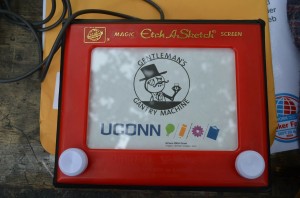
New York Maker Faire – September 20-21, 2014 – New York, NY
Dillon Jones ’15 (ENGR) – UConn IDEA Grant recipient
The Botler/The Gentleman’s Gantry Machine
Connecticut Invasive Plant Working Group (CIPWG) Symposium – October 7, 2014 – Storrs, CT
Aaron Rosman ’16 (CAHNR) – UConn IDEA Grant recipient
Small Plants, Big Questions: Asian Waterwort and Threestamen Waterwort
COMSOL Conference – October 10-14, 2014 – Boston, MA
Casey Settle ’15 (ENGR) – OUR Travel Award recipient
Analysis of Heat Transfer in a Complex Three Dimensional Structure Fabricated by Additive Manufacturing
Frontiers in Optics – October 19-23, 2014 – Tucson, AZ
Michael Cantara ’16 (ENGR) – OUR Travel Award recipient
Ultracold Trimer Formation Energetics of Rb and K
Biomedical Engineering Society (BMES) Annual Meeting – October 22-25, 2014 – San Antonio, TX
Stephanie Knowlton ’15 (ENGR)
Spatiotemporal Oxygen Monitoring for Three-Dimensional Engineered Tissues
Catherine Oliver ’15 (ENGR) – OUR Travel Award recipient
Analyzing ROS Generation from Magnetic Nanoparticles in an Alternating Magnetic Field and Its Role in Intracellular Hyperthermia
Kevin Smith ’16 (ENGR)
Investigating the Effects of Stromal Cell-Neuronal Cell Co-Culture on Neuronal Maturity and Neuronal Viability Under Oxidative Stress
Northeastern Educational Research Association Conference – October 22-24, 2014 – Trumbull, CT
Caroline Thompson ’15 (ED)
Career Paths of Elementary Educators: An Assessment of Attrition and Mobility in Connecticut by Type of Community
Society for Neuroscience (SFN) Annual Meeting – November 15-19, 2014 – Washington, DC
Ashlesha Dhuri ’16 (CLAS) & Xiao Li ’15 (CLAS) – OUR Travel Award recipients
Comparing Dorsal and Ventral Hippocampus Oscillations During Learning
Franchesca Kuhney ’17 (CLAS) – OUR Travel Award recipient
Human Conditioned Place Preferences Using Secondary Reinforcers
Kaitlin O’Connell ’15 (CAHNR) – OUR Travel Award recipient
Behavioral Effects of rmTBI Injuries in Mice Models
Sarthak Patel ’16 (CLAS) – OUR Travel Award recipient
Temporal Sequence Learning by Rats in a Radial Arm Water Maze
Margaret Rowland ’15 (CLAS) – OUR Travel Award recipient
Animal Models of Effort-Related Decision Making: The Antidepressant Fluoxetine Potentiates Effort-Related Effects of the Dopamine Depleting Agent Tetrabenazine
American Institute of Chemical Engineers (AIChE) Annual Meeting – November 16-21, 2014 – Atlanta, GA
Notations are included below for students who won poster presentation awards in their divisions.
Gianna Credaroli ’15 (ENGR) – 2nd Place in Separations
A New Thin Film Composite Membrane
Ari Fischer ’15 (ENGR) – 3rd Place in Catalysis and Reaction Engineering
Poster presentation: Thermochemical CO2 and H2O Splitting Via Chemical-Looping with Cerium and Cobalt Mixed Oxides for Oxygen Generation
Oral presentation: Conversion of Caffeine and Lipids in Catalytic Fast-Pyrolysis of Spent Coffee Grounds (Based on UConn IDEA Grant project)
Gabriella Frey ’15 (ENGR) – 1st Place in Separations
Formulating Draw Solution Mixtures for Forward Osmosis
Oscar Nordness ’15 (ENGR) – 2nd place in energy fuels and petrochemicals – OUR Travel Award recipient
Incorporation of High Pressure CLC into IGCC systems
Clarke Palmer ’16 (ENGR) – 3rd Place in Fuels, Petrochemicals, and Energy – OUR Travel Award recipient
Reactor Design and Analysis of a Simulated Moving Bed Reactor for Chemical-Looping Combustion
George Shaw ’15 (ENGR) – OUR Travel Award recipient
Fluorescence Nitro-Explosive Detection through Electrospun Pyrene-PES Nanofibers
Abbey Wangstrom ’15 (ENGR) – 2nd place in Reaction and Catalysis Engineering
High Activity, High Stability Pt/ITO Fuel Cell Catalysts
Learn more about the AIChE presentations via the School of Engineering.
ONGOING PROJECTS
Christina Cotte ’17 (CLAS) worked with Dr. Craig Nelson’s Genetics lab over the summer diagramming the trajectory of reprogramming cells and developing a Lineage Map of the early stage mouse embryos. She and her colleagues have found new information about the process of turning a fibroblast cell into a stem cell that will be helpful for its future use. A publication with their findings on the reprogramming stem cell project is in preparation. The Lineage Map project is Christina’s focus for the 2014-15 academic year.
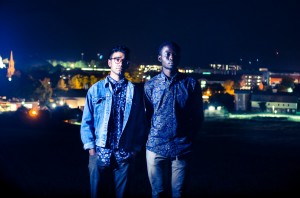
UConn IDEA Grant recipients Emmanuel Oppong-Yeboah ’15 (CLAS) and Joseph Rosen ’17 (CLAS) are currently soliciting submissions for the premiere issue of Exsistentia, a new multimedia literary journal that addresses existential questions through the art of curation. Submissions in all genres (poetry, prose, illustration, audio, film, etc.) that respond to the issue’s thematic question, “do you see me?,” will be accepted through January 1, 2015, via exsistentia.net.
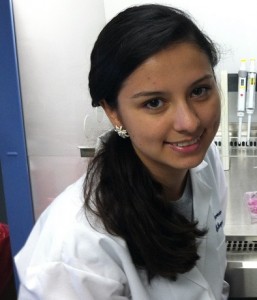
Ornella Tempo ’16 (ENGR) is conducting her McNair Scholars and Honors Thesis research in Dr. Yusuf Khan’s laboratory at UConn Health. She is studying the in vitro evaluation of calcium peroxide (CaO2) release from composite polylactic-co-glycolic acid (PLAGA) microsphere scaffolds. The objective of this project is to investigate the potential of a materials-only approach for guided bone regeneration.
• 2015 Roper Awards for Research Experience (RARE)
The Roper Award for Research Experience (RARE) supports undergraduate research apprenticeships that make use of the archives of the Roper Center for Public Opinion Research. We are pleased to announce the two student/faculty RARE teams who have received awards for Spring 2015 and thank the Roper Center for its generous support of these student awards. Congratulations, RARE awardees!
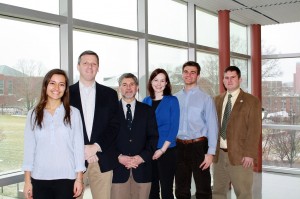
Project Title: The Role of Demographics and Socioeconomics on Views of the Food System and Food Access
Student Apprentice and Major: Christopher Bruno, Resource Economics
Faculty Mentor and Department: Benjamin Campbell, Agricultural and Resource Economics
Mr. Bruno and Professor Campbell will be using Roper Center data to consider how different groups view the food system and access information about food-related issues. They will examine how different groups view organic, local, and genetically modified food products, considering the role of race, gender, income, and other characteristics to better understand differences in perceptions. This research will culminate with the development of policy recommendations that address potential racial and/or income inequalities within the food system.
Project Title: Throwing the Bums Out: Public Attitudes Toward Scandal-Plagued Incumbents
Student Apprentice and Major: Erin Puglia, Political Science
Faculty Mentor and Department: Vincent Moscardelli, Political Science
Ms. Puglia and Professor Moscardelli will use exit poll data to consider the mechanism(s) by which Congressional incumbents involved in scandals lose vote share. While existing research has documented the phenomenon of reduced vote share for candidates in the election cycle in which a scandal is first reported in the media, the causal mechanisms have not yet been established, so this project aims to model this process.
• Congratulations, 2015 SHARE Award recipients!
SHARE Awards support undergraduate research apprenticeships in the social sciences, humanities, and arts. We are delighted to announce the 24 student-faculty teams selected to receive awards for Spring 2015 and thank the University of Connecticut Humanities Institute for its generous support of two of these student awards. Congratulations to all award recipients!
Project Title: Health Care Reform, Fertility, and Infant Health: Evidence from Massachusetts
Student Apprentice and Major: Andrew Carroll, Economics & Psychology
Faculty Mentor and Department: David Simon, Economics
Project Title: Too Much of a Good Thing? Excess Legitimacy and Democratic Principles in Argentina
Student Apprentice and Major: Katie Cavanaugh, Political Science & Management Information Systems
Faculty Mentor and Department: Matthew Singer, Political Science
Project Title: The Crane Wife at the National Festival of the Puppeteers of America
Student Apprentice and Major: Edward Cody, Puppet Arts
Faculty Mentor and Department: Margarita Blush, Dramatic Arts
Project Title: Racial Identity, Ethnic-Racial Socialization, and Adjustment among Youth of Color
Student Apprentice and Major: Kalea Coles, Human Development and Family Studies
Faculty Mentor and Department: Annamaria Csizmadia, Human Development and Family Studies
Project Title: Prior Art Search and Settlement Negotiations in Patent Dispute
Student Apprentice and Major: Brendan Costello, Political Science & Economics
Faculty Mentor and Department: Talia Bar, Economics
Project Title: Dramaturgies of Memory, Materiality, and Violence in African American Theatre
Student Apprentice and Major: Brighid DeAngelis, Theatre Design/Tech
Faculty Mentor and Department: Adrienne Macki Braconi, Dramatic Arts
Award Co-Sponsored by the University of Connecticut Humanities Institute
Project Title: Provision of Emotional Support to Increase Pumping Duration in High Risk Mothers
Student Apprentice and Major: Katherine Dinisi, Nursing
Faculty Mentor and Department: Jacqueline McGrath, Nursing
Project Title: Economic Rights in Islam and the Middle East
Student Apprentice and Major: Abdullah Hasan, Political Science & Women’s, Gender, and Sexuality Studies
Faculty Mentor and Department: Zehra Arat, Political Science
Project Title: The Linguistic Analysis of Graphic Novels
Student Apprentice and Major: Matthew Henderson, Linguistics/Psychology & Anthropology
Faculty Mentor and Department: Harry van der Hulst, Linguistics
Award Co-Sponsored by the University of Connecticut Humanities Institute
Project Title: Teaching the Vocabulary of Comprehension: A Technology-Enhanced System to Enhance At-Risk 3rd Graders’ Acquisition and Application of Essential Vocabulary (IVCS)
Student Apprentice and Major: Timothy Henning, Digital Media and Design
Faculty Mentor and Department: Michael Coyne, Educational Psychology
Project Title: Topics in Time Series Modeling of Inter-Event Durations
Student Apprentice and Major: Rajeshwari Majumdar, Economics & Statistics
Faculty Mentor and Department: Nalini Ravishanker, Statistics
Project Title: The Comparison of Maternal Descriptions of Late Preterm and Full Term Infant Breastfeeding Behaviors
Student Apprentice and Major: Lindsay Moore, Nursing
Faculty Mentor and Department: Ruth Lucas, Nursing
Project Title: The Politics of Environmental Action: Cities, Water Pollution, and Environmental Inequality in Latin America
Student Apprentice and Major: Renato Muguerza, Latin American Studies & Economics
Faculty Mentor and Department: Veronica Herrera, Political Science
Project Title: The Effects of Perceptual Fine-Tuning on Facial Recognition in Infancy
Student Apprentice and Major: Leighanne Ormston, Psychology & Biological Sciences
Faculty Mentor and Department: Heather Bortfeld, Psychology
Project Title: Visual History of Parks and Green Spaces in Waterbury, Connecticut
Student Apprentice and Major: Donato Pesce, Urban and Community Studies
Faculty Mentor and Department: Phil Birge-Liberman, Urban and Community Studies
Project Title: Ensuring Economic Growth Promotes Economic and Social Rights: The Role of Gender Equality in Education
Student Apprentice and Major: Gwendolyn Peyton, Economics
Faculty Mentor and Department: Susan Randolph, Economics
Project Title: Importance of Social Network Ties in Ad-Hoc Team Composition: Implications for Individual Team Member Performance
Student Apprentice and Major: Emily Roller, Psychology
Faculty Mentor and Department: Dev Dalal, Psychology
Project Title: Galatea Triumphant: Explorations in Figurative Ceramic Sculpture for Upcoming Solo and Group Exhibitions
Student Apprentice and Major: Catherine Solari, Sculpture/Ceramics
Faculty Mentor and Department: Monica Bock, Art and Art History
Project Title: Content Analysis of Colorado District Gifted and Talented Program Plans as Compared to the National Association for Gifted Children PK-12 Programming
Student Apprentice and Major: Jessica Stargardter, Elementary Education & History
Faculty Mentor and Department: E. Jean Gubbins, Educational Psychology
Project Title: Use and Acceptance of Technical Signs in Deaf Higher Education
Student Apprentice and Major: Emily Stassen, Individualized: American Sign Language and Deaf Culture & Molecular and Cell Biology
Faculty Mentor and Department: Diane Lillo-Martin, Linguistics
Project Title: Coverage of Haiti in the Dominican Republic’s Daily Newspapers: A Pilot Content Analysis Study
Student Apprentice and Major: Isamar Tavarez, Political Science
Faculty Mentors and Departments: Thomas Craemer, Public Policy & Samuel Martinez, Anthropology & Latin American Studies
Project Title: Development of Polysyllabic Word Reading Skill in Elementary-Age Children: A Descriptive Study
Student Apprentice and Major: LaShawna Thompson, Elementary Education
Faculty Mentor and Department: Devin Kearns, Educational Psychology
Project Title: Public Opinion on Renewable Energy
Student Apprentice and Major: Jessica Topper, Individualized: International Relations
Faculty Mentor and Department: Oksan Bayulgen, Political Science
Project Title: A New Methodology for Understanding Development through Joint Action
Student Apprentice and Major: Cassandra Zwarycz, Psychology & Human Development and Family Studies
Faculty Mentor and Department: Adam Sheya, Psychology
• Apply Now for Summer Research Fellowships and Internship Programs!
Undergraduate students who are interested in participating in a summer research program need to plan ahead. December is the time to gather together all the required elements of the applications, including faculty letters of recommendation. All of the exciting summer opportunities listed below have application deadlines in January! Don’t miss out on the opportunity to get research experience.
Mickey Leland Energy Fellowship Program (MLEF)
Deadline: January 2, 2015; http://orise.orau.gov/mlef/
The Mickey Leland Energy Fellowship (MLEF) is sponsored by the U.S. Department of Energy’s Office of Fossil Energy. It is a 10-week summer internship program that provides opportunities to students who are pursuing degrees in STEM fields. The goal of the program is to improve opportunities for minority and female students in these fields, but all eligible candidates are encouraged to apply. Selected undergraduates receive a weekly stipend of $600.
Science Undergraduate Laboratory Internships (SULI)
Deadline: January 9, 2015; http://science.energy.gov/wdts/suli/
The Science Undergraduate Laboratory Internship (SULI) program encourages undergraduate students to pursue science, technology, engineering, and mathematics (STEM) careers by providing research experiences at one of 17 participating Dept. of Energy laboratories.
Cold Spring Harbor Undergraduate Summer Research Program 2015
Deadline: January 15, 2015; http://www.cshl.edu/education/urp
The URP program is administered by the Watson School of Biological Sciences. It is designed to give students an opportunity to conduct first-rate research under the supervision of senior laboratory staff in the areas of cancer biology, neuroscience, plant biology, cellular and molecular biology, genetics and bioinformatics and genomics. Selected students receive room and board in addition to a $5,000 stipend.
DAAD RISE – Research Internships in Science and Engineering in Germany
Deadline: January 15, 2015; https://www.daad.de/rise/en/
DAAD RISE gives students in the fields of biology, chemistry, earth sciences, engineering and physics the chance to spend a summer working on research projects with doctoral students at German universities and research institutions. Interested students must first register online between December 6, 2014 and January 15, 2015. Students will then be able to access the internship offers submitted by the doctoral students in Germany prior to completing the application.
Summer Undergraduate Course Creating Excellence in Scientific Study (SUCCESS) – The Ohio State University, College of Medicine – Deadline: January 23, 2015
https://medicine.osu.edu/mstp/Pages/index.aspx
This 9-week research experience is hosted by the Medical Scientist Training Program (MSTP). The program encourages applications from students whose backgrounds and experiences would bring diversity to the field. Applicants must have an expected college graduation date in 2016 or 2017. $3,800 stipend and housing provided.
Natural History Research Experience (NHRE)
Deadline: January 27, 2015; http://www.mnh.si.edu/NHRE/index.htm
This is a 10-week summer internship program at the National Museum of Natural History in Washington, DC. Interns work closely with scientific mentors to complete research projects in Earth Science, Biology, and Anthropology. Stipend of $5,500.
Centers for Disease Control & Prevention – Collegiate Leaders in Environmental Health Internship
Deadline: January 28, 2015; http://www.cdc.gov/nceh/cleh/overview.htm
This is a paid 10-week summer environmental internship for undergraduate students who are passionate about the environment and interested in human health. Interns will participate in a comprehensive program including environmental health project assignments as well as interaction with federal officials and scientists. Interns will be able to attend the many seminars offered by the CDC during the summer. Stipend of approximately $600 per week. Student must be rising juniors or rising seniors in Fall 2015.
Summer Public Health Scholars Program (SPHSP) – Columbia University
Deadline: January 31, 2015; http://ps.columbia.edu/education/student-life/office-diversity/programs/college-and-post-baccalaureate-students/summer-publ
The Summer Public Health Scholars Program (SPHSP) is designed for undergraduate students who are interested in public health and biomedical science careers. Applicants must have completed at least two years of college. Students from underrepresented groups are encouraged to apply. Selected students will be provided with a stipend, housing, and round trip travel.
ThinkSwiss Research Scholarships – Deadline: January 31, 2015
http://thinkswiss.tumblr.com/About
ThinkSwiss scholarships support highly motivated undergraduates who are interested in doing research at a public Swiss university or research institute. The scholarship is open to students in all fields. A monthly stipend of approximately $1,100 is provided.
• Congratulations, Summer 2014 SURF Award Recipients!
SURF is the largest competitive funding opportunity administered by the UConn Office of Undergraduate Research. I am delighted to announce that 59 UConn undergraduates have been offered SURF awards for summer 2014. The faculty review committee was impressed by the overall high caliber of the 108 applications submitted this year.
Congratulations to the SURF awardees! Your academic achievements, creativity, and initiative were evident in your applications. You have a challenging summer of deep engagement with the process of research ahead of you. We look forward to hearing about all you learn!
Thank you to the faculty members who supported SURF applicants: mentors, letter writers, and faculty review committee members! SURF represents a collaborative effort between students and faculty. This program would simply not be possible without the support and participation of faculty members!
Thank you, too, to SURF supporters in the UConn community. We are grateful to the Provost’s Office and to the Deans of the Schools and Colleges of Agriculture and Natural Resources, Engineering, Fine Arts, Pharmacy, and Nursing, who all contributed funding to the SURF competition this year. Alumni, parents, and friends of UConn also helped fund SURF awards. This collaborative funding effort ensures that SURF supports a diverse array of undergraduate research endeavors!
Once again, congratulations to those students offered 2014 SURF awards.
Caroline McGuire, Ph.D.
Director, Office of Undergraduate Research
• Congratulations, Spring 2014 UConn IDEA Grant Award Recipients!
Congratulations to the twenty UConn undergraduates who have been awarded UConn IDEA Grants! 
Fourteen of the twenty award recipients will be completing individual projects, and the remaining six will be working on collaborative group projects.
Click here to learn more about the UConn IDEA Grant recipients and their projects.
Special thanks to the faculty and staff that supported student applications to the UConn IDEA Grant and to those who will be mentoring the award recipients as they complete their projects.
The UConn IDEA Grant program awards undergraduates funding to support self-designed projects including artistic endeavors, community service initiatives, traditional research projects, entrepreneurial ventures, and other innovative projects. Proposals for the UConn IDEA Grant represented a variety of disciplines, ranging from fine arts to marine sciences. The program is open to undergraduates in all majors at all campuses.
• Upcoming Presentations of Student Research and Creative Activity
While the largest-ever Frontiers in Undergraduate Research Poster Exhibition may now be over, there are several additional opportunities to see UConn students’ work in the coming days and weeks.

BFA Art Exhibition
April 17-27, 2014
ArtSpace, Windham Gallery, 480 Main Street, Willimantic, CT 06226
See this exhibition of work by students graduating from the BFA program in the Art and Art History Department, School of Fine Arts.
UConn School of Nursing ATHENA Research Conference
April 25, 2014
School of Nursing Widmer Wing
The program for this annual conference includes a poster presentation session from 1-2:30pm featuring the work of Honors students.
Language Fest 2014
April 26, 2014
9am – 4pm, Oak Hall
The UConn Language Fest is a University-wide research conference, now in its fourth year, which showcases the many facets of research on language in the UConn community. Poster sessions are scheduled for 10-11am, 1-2pm, and 3-4pm, and feature the work of undergraduate researchers from a number of UConn departments and programs.
Undergraduate Research Colloquium in Biology
May 2, 2014
8:30am-6:00pm, TLS 111
Graduating senior biology students (BIOL, PNB, EEB, MCB, BPHYS) will present short talks on their research at this 32nd annual biology research colloquium. All presentations are limited to ten minutes. Advisors, undergraduates, graduate students, faculty, postdocs, staff, parents, and friends are welcome and encouraged to attend.
UConn School of Engineering – Senior Design Demonstration Day
May 2, 2014
1-4pm, Gampel Pavilion
Senior Design Day, an exhibition of capstone projects from across the School of Engineering, affords parents, alumni, friends and project sponsors the opportunity to view project outcomes, interact with students and faculty, and learn more about the School. This year, 475 students will display and demonstrate 154 projects, and the whole university community is invited.
• Join us for the screening of two student documentaries!
Please join us for a screening of two original documentaries directed by UConn IDEA Grant Recipients Peter Logue and David Pereira. A discussion with the filmmakers will follow the screenings.
Documentaries:
The Search for the White Rose – a film by Peter Logue – View the film trailer
Free Time – a film by David Pereira and RJ Anderson
Date: Friday, April 11th
Time: 7:00PM
Location: Laurel 101
Click here for more information on the documentaries.